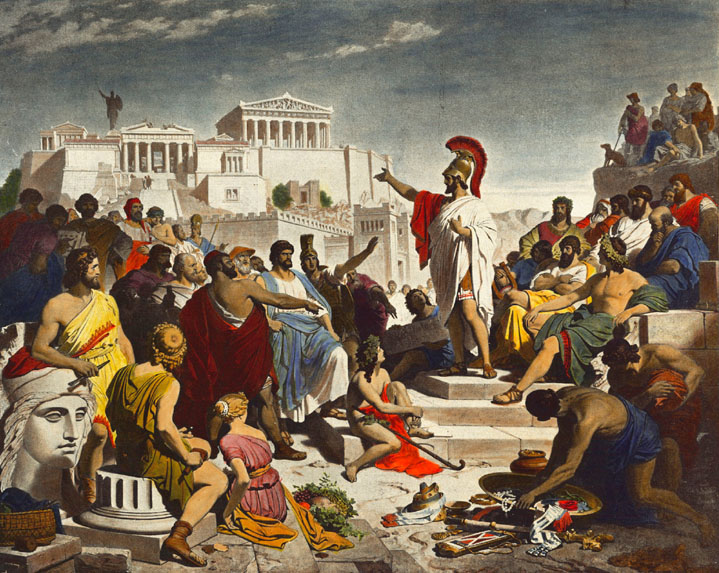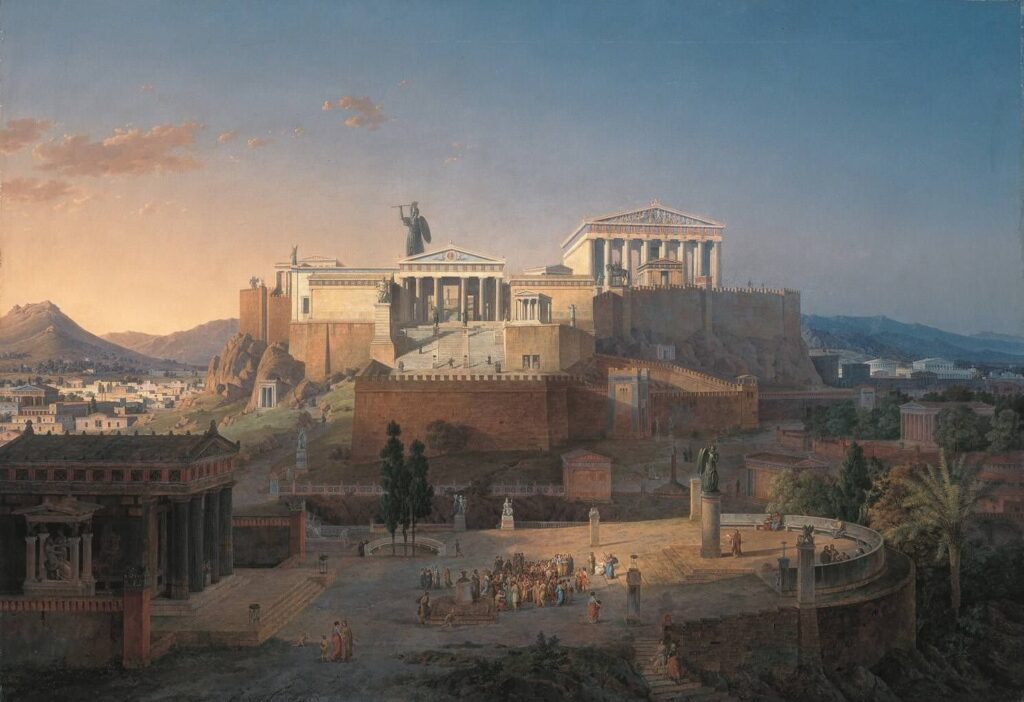Pericles (495–429 BCE) was a prominent Athenian general and statesman. He died aged 66, of plague. I find him to be a fascinating historical figure – he’s arguably one of the most important individuals in influencing what some people call The Golden Age Of Athens. If we want to recreate a Golden Age in our lifetimes, studying Pericles’ life seems relevant.
His name meant “surrounded by glory”, and he lived up to it. He was born wealthy and influential, but rather than being a failson he instead challenged and inspired others to greatness. (Heptapolis.com: Pericles was a nobleman with “the bluest blood”… despite this, he was popular with ordinary Athenians and had the rhetorical skills to talk them into doing almost anything.)
Historian Thucydides described him as “the first citizen of Athens”. He promoted arts and literature, and started an ambitious project that built most of the surviving structures on the Acropolis, including the Parthenon.
At the end of the first year of the Peloponnesian war with the Spartans (431 – 404 BCE), he gave a famous speech called Pericles’ Funeral Oration. I personally consider this to be one of the best speeches ever given, and one that puts many contemporary orators to shame. It’s fairly short, everybody should read it.

Pericles had many tutors in his life, including Zeno of Zeno’s Paradox fame. (This corroborates with David Banks’ hypothesis that exposure to great teachers at a young age has an outsized effect.)
✱
Pericles had his political opponent Cimon ostracized, ie cast out of town – by acusing him of aiding the enemy (Sparta).
✱
According to Plutarch, Pericles’ lover Aspasia’s house in Athens was an intellectual centre, attracting nerds like Socrates. She had been alleged to have been a hetaira, a sort of highly-educated geisha-esque elite courtesan type? It’s complicated, scholars argue about it.
✱
Consider the role of the Parthenon, which Pericles personally oversaw the construction of – an ambitious, awe-inspiring building to house goddess Athena – the patron and protectress of the city (and citizens) of Athens.
It took 15 years to build (447-432 BC). (Heptapolis: According to Plutarch, who wrote centuries after the building was completed; one of the main reasons for the construction of the Parthenon and the other temples which surrounded it was the need to deal with growing unemployment. By embarking on a major public works program for the acropolis (the towering hill in Athens where the Parthenon and other temples dedicated to the gods were located) Pericles hoped to provide jobs for ordinary Athenians- carpenters, stonemasons, ivory-workers, painters, enamellers, pattern-makers, blacksmiths, rope-makers, weavers, engravers, merchants, coppersmiths, potters, shoemakers, tanners, laborers, etc.)

✱
Further reading:
/r/AskHistorians: How was Pericles the ‘ruler’ of Athens if it was a direct democracy?
He was hardly the “ruler”, though he was influential enough that it could be easy to see him that way.
Thucydides, II.65: “Pericles indeed, by his rank, ability, and known integrity, was enabled to exercise an independent control over the multitude–in short, to lead them instead of being led by them; for as he never sought power by improper means, he was never compelled to flatter them, but, on the contrary, enjoyed so high an estimation that he could afford to anger them by contradiction. Whenever he saw them unseasonably and insolently elated, he would with a word reduce them to alarm; on the other hand, if they fell victims to a panic, he could at once restore them to confidence. In short, what was nominally a democracy became in his hands government by the first citizen. With his successors it was different. More on a level with one another, and each grasping at supremacy, they ended by committing even the conduct of state affairs to the whims of the multitude.”
✱
House Of Pericles And Aspasia, Heptapolis.com:
“The Golden Age of Athens was during the rule of Pericles over Athens from 457 B.C. to 430 B.C. During this time the Parthenon was built, Aeschylus, Aristophanes and Sophocles were producing plays in the theater beside the Acropolis and democracy flourished. Pericles ruled over what has been described as the world’s first democracy and mathematics, the arts, history, astronomy and philosophy flourished under Socrates, the Sophists, Herodotus and Thucydides.
During the Golden Age of Greece, Athens was home to about 75,000 people and and between 200,000 and 250,000 lived in the surrounding countryside called “Attica.” The city had an area of about 0.7 square miles.
Under Athens and the Delian League the Greeks ruled much of the Mediterranean and trade flourished. Using iron to make tools, superior ships, weapons and machines Athens grew rich by exporting silver and olives. The money earned from this trade was used to construct other great building and support the arts and sciences.
But things were not always as rosy as they seemed on the surface. A lot of the money used to build the Parthenon was looted from the Delian League treasury, less than a quarter of the population had political rights, slaves were often used instead of machines because they were cheaper, and war with Sparta was imminent. The upper classes ruled the government and many of the democratic reforms, such as payment for jury duty, were attempts to placate the lower classes with welfare payments and keep them in place. In the plains of Attica there only about 250,000 people. The population of the city-state of Athens had would later be reduced by the Peloponnesian wars and the plague from around 80,000 to as a low as 21,000.”
^ Some interesting riffs in here about Pericles’ perspective on the Parthenon, and about using its treasure to finance Athens’ through difficult periods
✱
Also consider: Al-Ma’mun, who strikes me as the Pericles of Baghdad in the 800s.